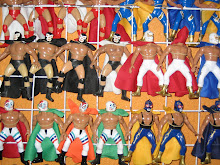
Passover (aka Pesach) began last week, and Jews worldwide celebrated their ancestors´ freedom from slavery in Egypt. As part of the holiday’s tradition, they abstained from eating leavened bread for an eight day period. To many readers of this blog, this is not groundbreaking news. Far less obvious, however, is that my Passover in Venezuela has been one of gastronomic plenty; I have not gone hungry despite abstention from leavened bread. This is my third Passover in a Latin American country–the previous two being Chile and Mexico–and my waistline surprisingly has not diminished by any means. Access to my own kitchen during the past week has played a huge role, granting me the liberty to prepare my meals at home. But regarding meals outside, I can thank a few other key factors that make this holiday’s eating less complicated: the presence of Jewish food stores in Caracas and a few traditional Venezuelan foods like arepa, pabellón criollo and yuca.*
Unaware of my good fortune to come, I prepared for the worst during the preceding weeks. The past offered reason to worry: I had struggled to find kosher-for-Passover meals in Chile and Mexico previously. In the case of the former, Chilean breakfasts overwhelming depended on leavened white bread. In the case of the latter, I had overdosed on corn tortillas –my one viable alternative to bread– by the time that the Pesach rolled around during my stay in Mexico. My complicated experiences in Chile and Mexico encouraged me to better stock up on matzah, the infamously bland cracker permitted during Passover.
Fortunately, I had the opportunity store up my matzah cache. A few weeks ago, I was in Caracas – the nucleus of the Venezuelan Jewish community and a city where Jewish food stores abound. Relatively speaking. It was not exactly easy to get my hands on the necessary Passover food items such as matzah, gefilte fish, horseradish, matzah meal, etc. To obtain these items, I spent two hours schlepping through Caracas and passed through three different specialty food stores. The final Jewish food store (a whole-in-the-wall gem called “Galipan”) was fully stocked with everything I needed. They even sold six-pound packages of matzah from 2008–at a discounted price! What more could one want? I left Caracas with enough kosher-for-Passover carbohydrates to make it through the imminent eight-day period of no bread.
Yet the holiday leaves me surprised, for this week I have fully realized the wealth of Venezuelan alternatives to leavened bread. First, one must consider the most common of unleavened starches in this country: arepa. This staple food looks like an English muffin, but Venezuelans make it with cornflower and without yeast. One can find arepa on almost any street corner in the morning, so it serves as an omnipresent last resort in case matzah ever runs out.
Second, Venezuelans often serve pabellón criollo, one of the country’s favorite dishes. It includes black beans, rice, seasoned minced-beef and fried plantains (seen in the picture above). This bread-free meal is not a traditional seder plate, but it will sate a person’s most desperate hunger any day.
Finally, the Venezuelan kosher-for-Passover diet would not be complete without the nation’s most popular root vegetable: yuca. Peeled, chopped and boiled, this vegetable has the waxy texture reminiscent of a russet potato, but it exudes many subtle differences in taste. Boiled and well-salted yucca often accompanies braised beef or finds its way into chicken or fish soup. Or, Venezuelans can mash it up, turn it into a flat round, and bake it into a thick cracker known as casave. To my comfort, all yucca-made delicacies are 100% unleavened and, therefore, kosher-for-passover.
In the end, the bounty of kosher alternatives made the bread-free holiday easier, but they did not alter my regular Passover meditations. I still thought of every year’s traditions on the first evening of Pesach: the stories, songs, and traditional foods. I still considered the symbolic significance of the holiday too. And I thought of my family. There was only one difference: I pondered this year’s Passover meditations as I chewed on a piece of boiled yucca. It was most definitely a Venezuelan Passover.
*Note: Ashkenazi Jews of eastern European descent –such as me– traditionally refrain from foods containing corn and rice during Passover. Given my consumption of these ingredients, the strictest of Ashkenazi Rabbis would chide me; my shtetl born grandmother would probably raise an eyebrow. For those critics, I respond: tranquilo, poco a poco (“relax, little by little”). In other words, new countries require flexibility.
Other updates from the month of April
Recent Photos
Diving for Pepitonas on the Araya Peninsula
ALBA in Cumaná
This week in Cumaná, President Hugo Chavez hosts a summit meeting for ALBA (Alternativa Bolivariana para los Pueblos de nuestra America). Ten heads of state from various Latin American countries will convene in Cumaná for the affair. To the surprise of many, state education authorities suspended academic and administrative activities at the primary, secondary, and university levels. On the bright side, this gives me time to update the blog a little bit.
Crossing the Orinoco River
On April 26th, I will participate in a 3.1km swim across the Orinoco River near the City of Guayana. Don’t worry: I will not be alone. Approximately 900 swimmers from the entire republic and abroad convene to partake in the swim. Suffice it to say, I am quite excited. Be ready at the end of the month for an entry about my experience.



